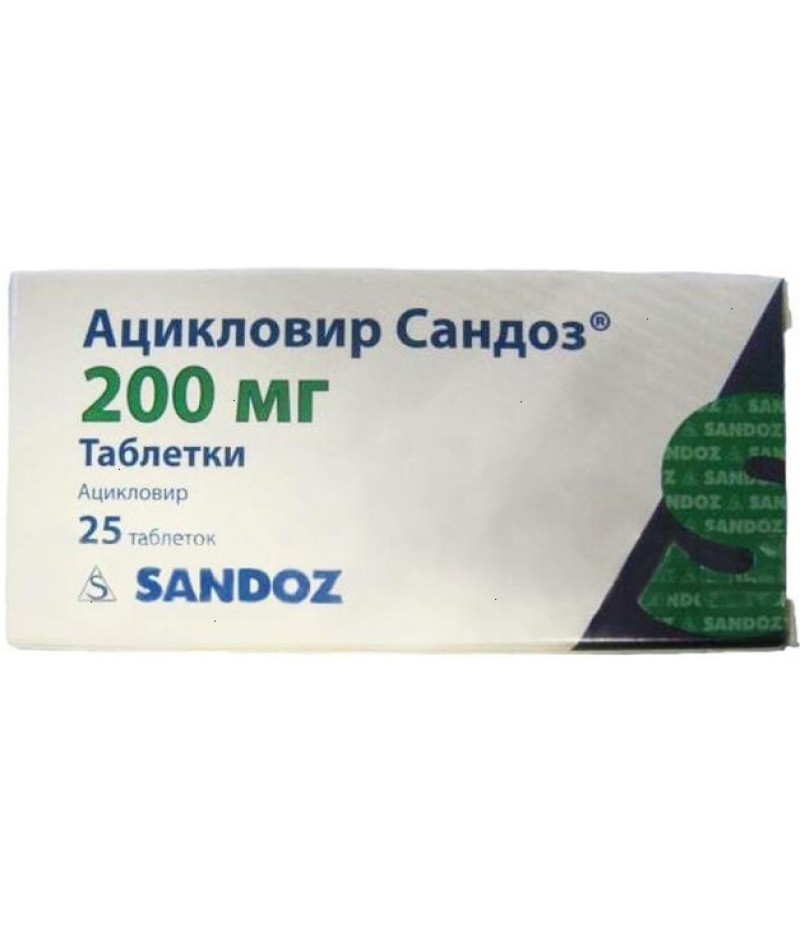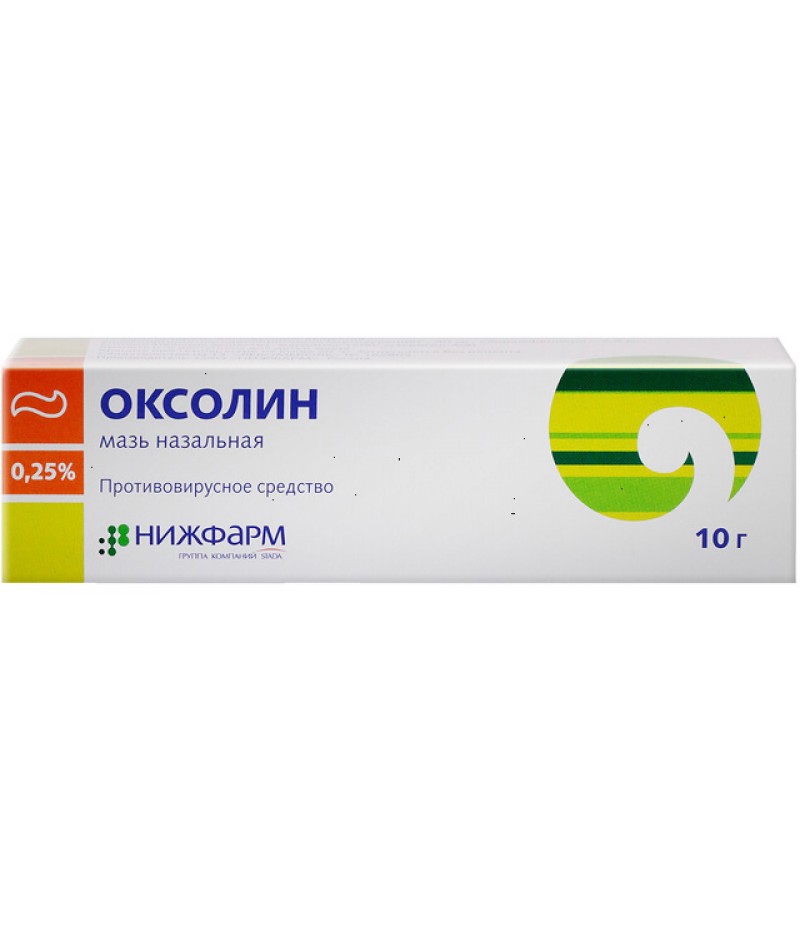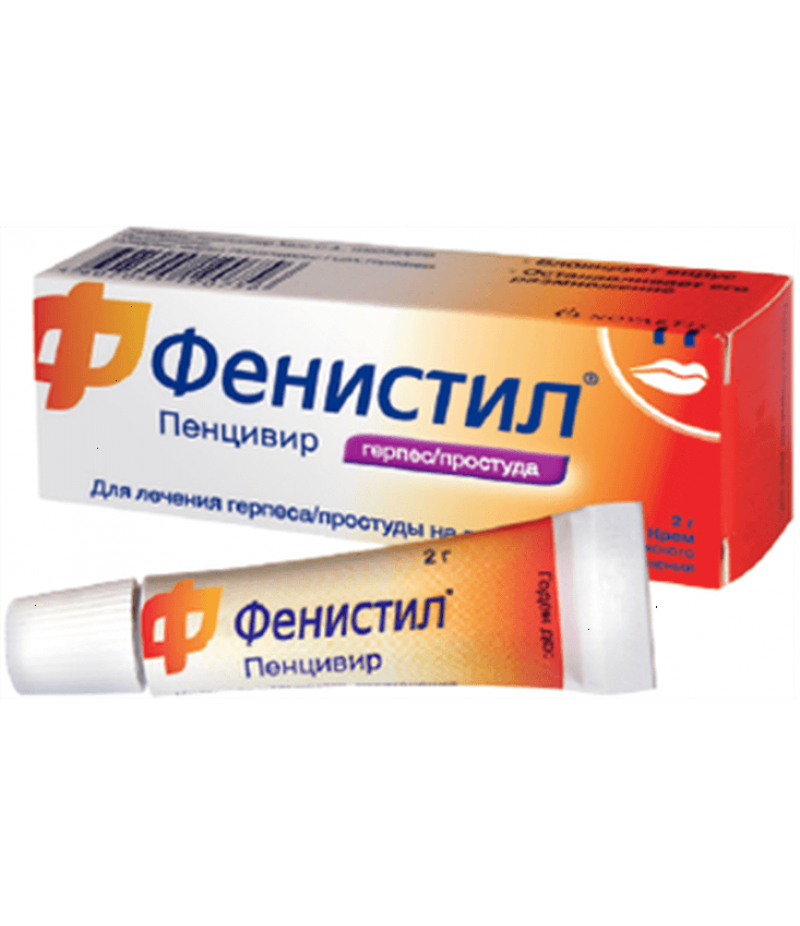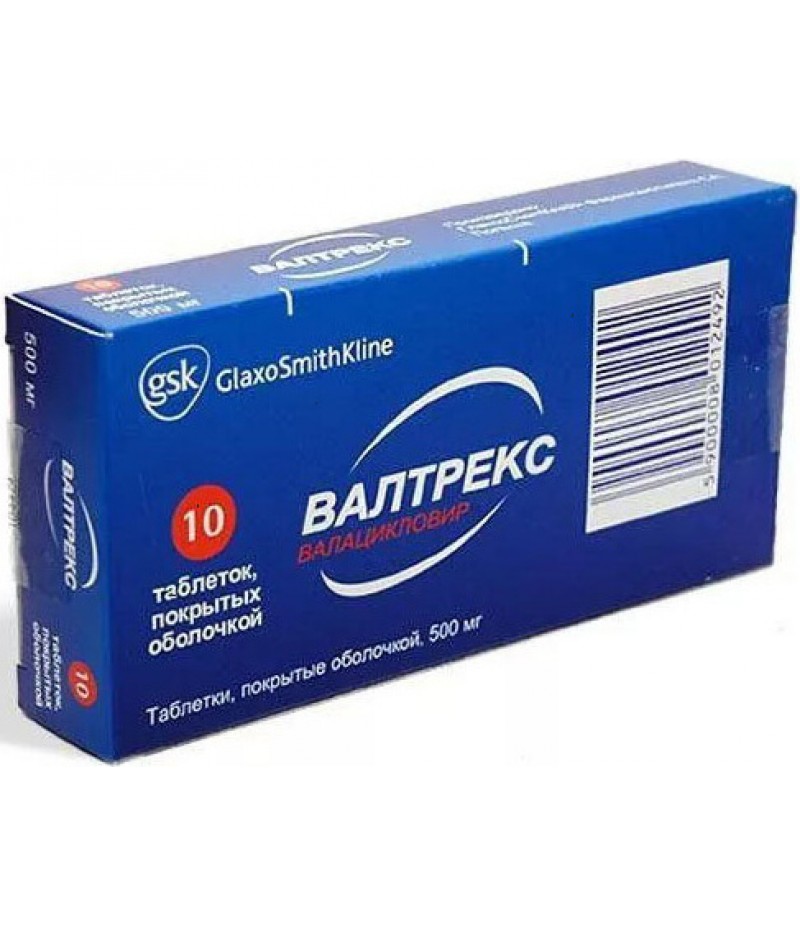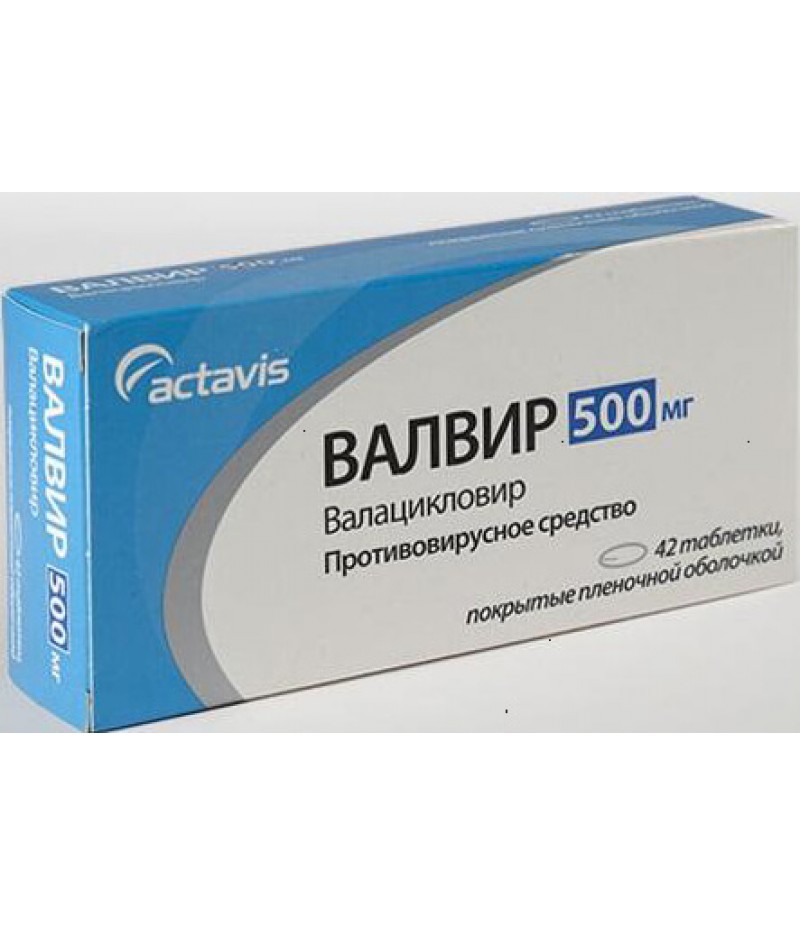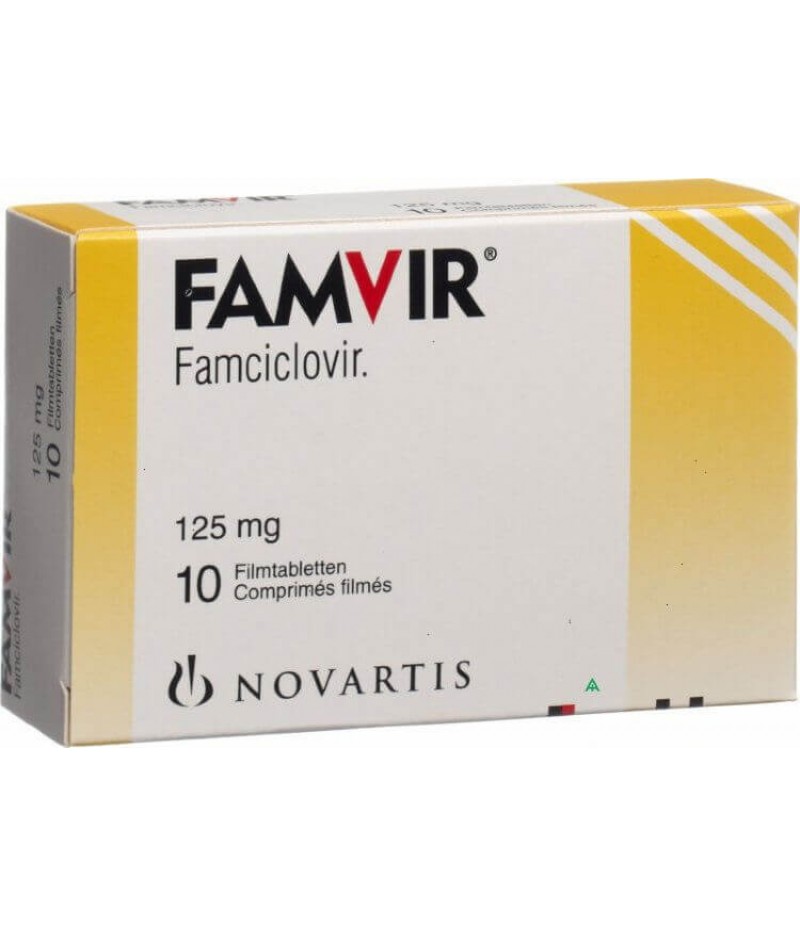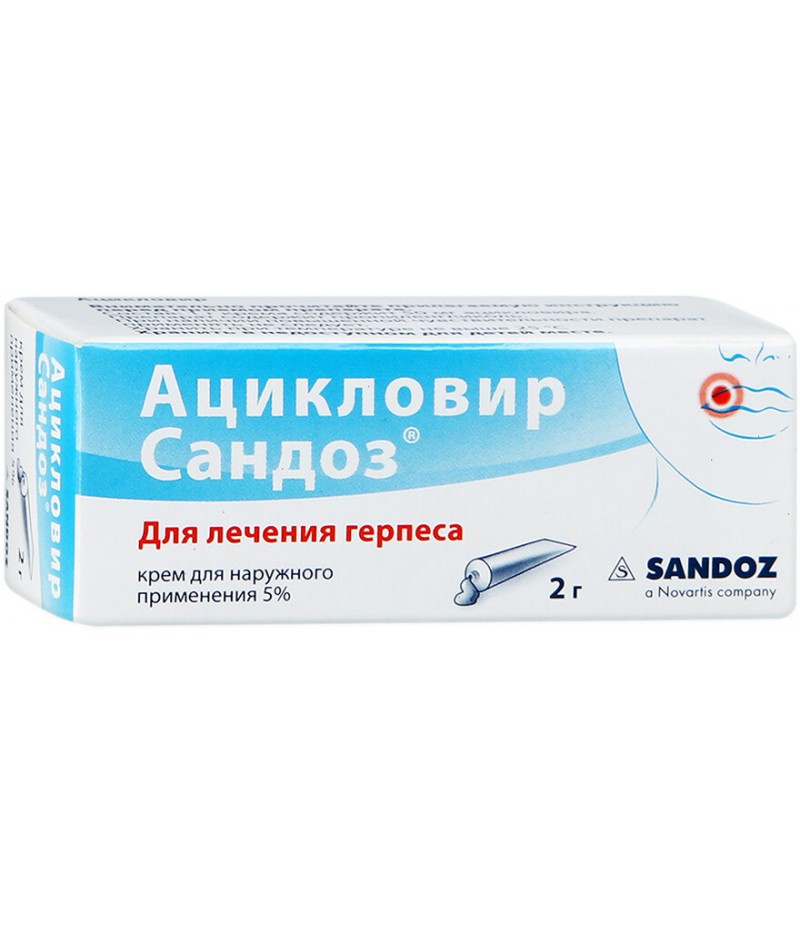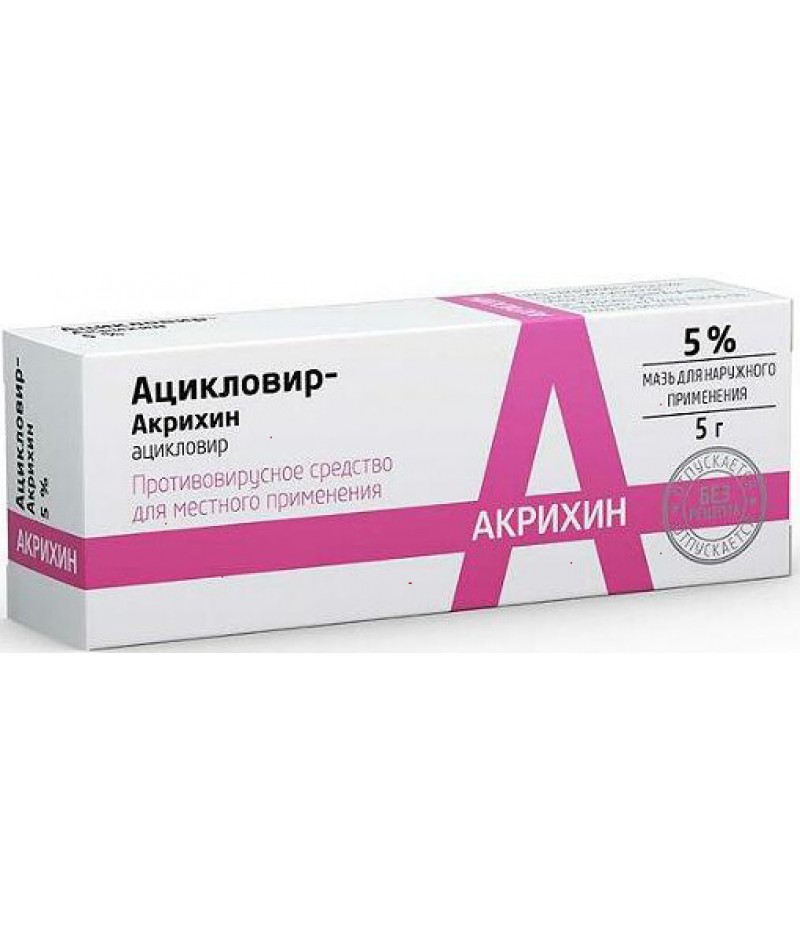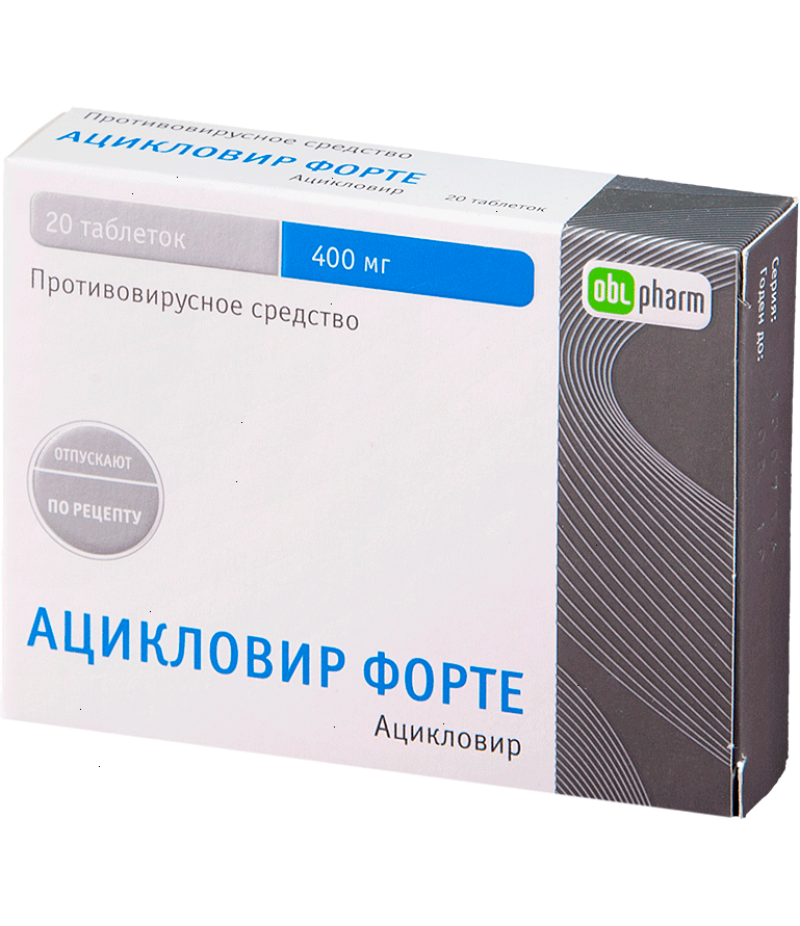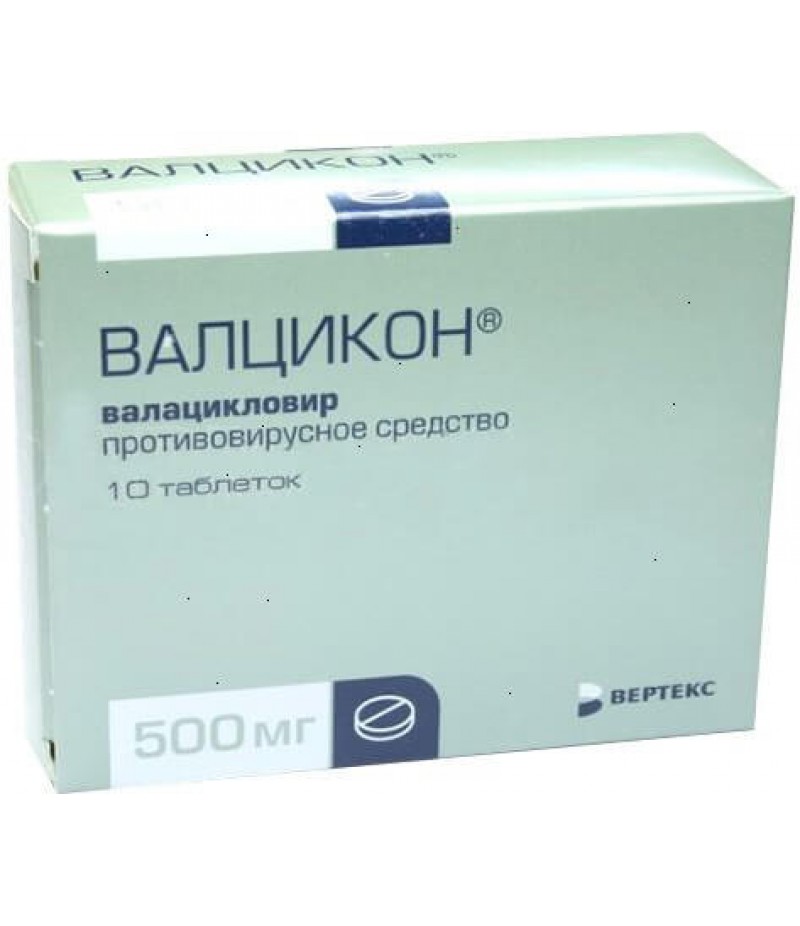Acyclovir tabs 200mg #25
- $9.27
- 3 or more $9.13
- 5 or more $9.05
- Availability:In Stock
Acyclovir instructionReed more and buy Acyclovir pillsComposition of AcyclovirAccording to medical Wikipedia, an antiviral treatment agent - Acyclovir is included in the ointment, cream, tablets and injection solution as active in..
Tags: tabs
Acyclovir instruction
Reed more and buy Acyclovir pills
Composition of Acyclovir
According to medical Wikipedia, an antiviral treatment agent - Acyclovir is included in the ointment, cream, tablets and injection solution as active ingredient in the mass part according to the drug dosage form: 1 gram of ointment - 50 mg; 1 gram of ophthalmic ointment - 30 mg; 1 gram of cream - 50 mg; 1 tablet - 200 mg or 400 mg; 1 vial with lyophilizate - 250 mg, 500 mg or 1000 mg.
Additional ingredients of medicinal products may differ depending on the manufacturer.
Form of issue
The drug Acyclovir is produced in the form of:
tablets No. 10-100;
lyophilizate in bottles number 1;
ointments and cream in tubes of 2-30 grams;
eye ointment in tubes of 2-5 grams.
pharmachologic effect
Antiviral (antiviral).
Pharmacodynamics and pharmacokinetics
The official abstract to the drug Acyclovir relates its active ingredient to the group of antiviral (antiherpetic) therapeutic agents that are synthetic analogs of the purine nucleoside, which has the ability to suppress the replication of viral strains Varicella zoster (varicella zoster, shingles), cytomegalovirus, Epstein-Barr virus and 1- and the second type of the Herpes simplex virus (herpes simplex).
In infected cells, including the viral enzyme thymidine kinase, a process of phosphorylation results in the conversion of Acyclovir into monophosphate form. Then, sequentially, under the influence of guanylate cyclase, monophosphate passes into the form of a diphosphate and subsequently, under the influence of some cellular enzymes, into the form of triphosphate. Since for the thymidine kinase enzyme in healthy, virus-free cells, Acyclovir is not a substrate, its high selectivity for direct exposure to viruses and insignificant toxicity for the remaining cells of the human body are manifested.
At present, there are three mechanisms of inhibitory effect of the drug in the form of triphosphate on the replication of viral DNA, which consist of: the competitive replacement of deoxyguanosine triphosphate in the process of DNA synthesis; in the introduction into the synthesized DNA-chain and the termination of its lengthening; in the suppression of the viral enzyme of the DNA polymerase. As a result of these processes in the human body, there is a blockage of further replication of the virus. High specificity and selectivity of the action of the active ingredient of the drug are also due to its advantageous cumulation in the virus-infected cells.
The use of the drug in herpetic infection prevents the emergence of fresh elements of the rash, reduces the likelihood of development of visceral complications and skin dissemination, accelerates the formation of external crusts, reduces pain in the acute phase of treatment of herpes zoster. There is also some immunostimulating effect.
Tablets Acyclovir after oral intake absorbed in the intestine only partially. Absorption of the drug, because of its low lipophilicity, occurs on average by 20%, from which the tablets Acyclovir has bioavailability within 15-30%. Nevertheless, such concentrations of the remedy are sufficient for effective control of viral infections. In parallel, the food intake practically does not affect the absorption processes. When the dosage is increased, the bioavailability decreases.
With an oral daily intake of 1000 mg (5 times 200 mg), the Cmax observed after 1.5-2 hours is 0.7 μg / ml, the Cmin reading is 0.4 μg / ml. Binding with whey proteins varies within the range of 9-33%. The injected Acyclovir iv (intravenously) or orally (inside) passes through the blood-brain barrier and the placenta. In therapeutic concentrations penetrates the tissues / organs of the human body, including: the brain, intestines, muscles, liver, spleen, lungs, uterus, kidneys, lacrimal fluid, breast milk, watery moisture, semen, secret and vaginal mucosa, amniotic fluid, herpetic bubbles. It is detected in the cerebrospinal fluid twice as low as in plasma. When 1000 mg / day is taken, the content of the drug in breast milk is in the range of 0.6-4.1% of the serum level, which implies the receipt of a daily dose of the drug by the baby about 0.3 mg / kg.
Metabolic transformations of the active ingredient occur in the liver with the formation of the main metabolite, 9-carboxymethoxymethylguanine. Through tubular secretion, as well as glomerular filtration, the kidney excreted 62-91% in unchanged form and approximately 14% in the form of 9-carboxymethoxymethylguanine. The intestine displays less than 2% of the drug, only its trace amounts are light.
When a one-time, 6-hour hemodialysis session is performed, approximately 60% of the active ingredient of the drug is filtered out, and there is no significant change in its clearance with peritoneal dialysis.
In adults, oral T1 / 2 takes approximately 3.3 hours, with an IV injection of about 2.5 hours. In children under 18, T1 / 2 is approximately 2.6 hours. With age, the rate of excretion slows down, but T1 / 2 increases insignificantly.
In chronic failure of the severe function of kidney T1 / 2 can reach 20 hours. Depending on the KK (creatinine clearance) in adult patients with renal insufficiency T1 / 2 on average is: KK 50-80 ml / min - 3 hours; SC 15-50 ml / min - 3.5 hours; the state of anuria is 19.5 hours; Conduction of hemodialysis - 5.7 hours; outpatient permanent peritoneal dialysis - 14-18 hours.
Ointment Acyclovir and Acyclovir cream when applied to intact (undamaged) integuments are not actually absorbed. The active ingredient of the local dosage forms of this preparation, as well as the products of its metabolism, are not determined in serum and urine. When applying the external forms of the drug to the structurally altered / affected skin, a moderate absorption of the ingredients of the cream and ointment of Acyclovir is observed, from which some of them nevertheless penetrate into the blood plasma and subsequently into the urine.
In patients with normal renal function, the serum Cmax value of the drug is approximately 0.28 μg / ml, in patients with CRF, the plasma content of the active ingredient reaches values of up to 0.78 μg / ml.
Approximately 9.4% of the daily dosage is excreted by the kidneys.
Eye Acrylic Acyclovir easily overcomes the corneal epithelium and creates a therapeutic level of the drug in the intraocular fluid. At the moment, there are no methods for determining the active ingredient of this drug in the form of an ophthalmic ointment in the blood serum. A small concentration of the drug is determined only in urine and is therapeutically insignificant.
Indications for use
Tablets Acyclovir-Akri (Akos, Nizhpharm) and other manufacturers, as well as lyophilizate (for example, production Belmedpreparaty), are indicated for the purpose of prevention and / or therapy of primary, secondary and recurrent infectious disease states provoked by virus strains I and II type Herpes simplex (herpes simplex), including its genital form, and the Varicella zoster strain (shingles and chicken pox). Systemic use of these dosage forms of the drug can be practiced both in patients with normal immunity and in patients with immunodeficiency, including HIV infection and post-transplantation states.
Gel and ointment Acyclovir (Acry, Synthesis, Ozone, Vertex, etc.) is used externally in the treatment of (most often complex) skin herpetic eruptions, provoked by strains of type I and type II herpes simplex (including its genital form), as well as in the treatment of external manifestations shingles and chicken pox.
Ophthalmic ointment is used for the treatment of herpetic keratitis, provoked by strains of type I and type II of herpes simplex (previously it is possible to use cleansing drops for the eyes).
Contraindications
Contraindications to the administration of tablets, lyophilizate and all external forms of the drug include: personal hypersensitivity of the patient to the active ingredient or additional components of the dosage form; personal hypersensitivity to valacyclovir; age up to 2 years (for tablets); breast-feeding (for lyophilizate and tablets).
In the careful use of external forms of the medicinal product pregnant and lactating women need; oral and injectable forms - pregnant women, patients with neurological disorders, renal failure (the possibility of nephrotoxic effects), dehydration, a neurological response to taking cytotoxic drugs (including a history of the patient).
Side effects
Tablets medicinal forms of the drug in some cases can cause the following side effects:
drug allergy (hypersensitivity reactions);
nausea, vomiting;
erythropenia;
diarrhea;
fever;
abdominal pain;
leukopenia;
skin rash;
lymphocytopenia;
headache;
hair loss;
dizziness;
increased serum levels of liver enzymes, bilirubin, creatinine, urea (transient);
fast fatiguability;
hallucinations;
drowsiness / insomnia;
decrease in concentration.
Instructions for use of Acyclovir (Method and dosage)
Acyclovir tablets, instructions for use
Instructions for Acyclovir-Acos tablets, as well as the instructions for Acyclovir-Acry tablets, as well as other manufacturers, recommend oral intake of tablet formulations together with water (200-250 ml) immediately after meals or during meals. Children after 2 years of age weighing more than 40 kilograms show the appointment of daily dosages similar to those for adult patients.
Herpes simplex herpes simplex therapy usually involves a 5-day daily intake of 200 mg of the drug (for example, Acyclovir-Acos tablets) in patients with normal immune status or 400 mg (eg Acyclovir-Acry tablets) for patients with immunodeficiency for a 5- 10 days.
Prevention of herpes simplex mucous membranes and skin, usually passes in 400 mg tablets (eg, Acyclovir Stud 400 mg) taken every 12 hours.
Treatment of uncomplicated genital herpes on average takes 10 days with an oral 5-fold (every 4 hours) daily intake of tablets at a dose of 200 mg (eg, Acyclovir-Acos).
Intermittent therapy of recurrent genital herpes (less than 6 relapses per year) suggests a 5-fold (every 4 hours) daily intake of 200 mg of the drug for 5 days.
Prolonged suppressive treatment of recurrent genital herpes (more than 6 relapses per year) means a 2-times-a-day intake of 400 mg of the drug (eg Acyclovir Forte tablets) or 3-5 times a day 200 mg of the drug.
Therapy of herpes zoster takes from 7 to 10 days with a 5-fold daily internal intake of 800 mg of the drug in the form of tablets.
Treatment of varicella (chicken pox) is carried out for 5 days with a 4-time daily intake of 800 mg of the drug. Proceed to such treatment should be when the earliest symptoms or signs of disease are detected. Children from 2 years old weighing up to 40 kilograms show a 4-fold daily intake of the drug at a dose of 20 mg per kilogram of weight.
Therapy of patients with CRF should take place at reduced dosages depending on the CC (creatinine clearance), and therefore, before taking the drug should be set precisely the value of this indicator. In the treatment of herpetic lesions in patients with CK less than 10 ml / min, the daily dose is reduced to 400 mg, with the intake of 200 mg after 12 hours. When treating the diseases provoked by Varicella zoster, patients with CC less than 10 ml / min are recommended a 2-times daily intake of 800 mg of the drug; with KK 10-25 ml / min - a 3-fold reception of a similar dose.
Overdose
Episodes of overdose can occur when using oral or injectable dosage forms, as well as in the case of swallowing external forms of the drug.
Negative symptoms of an overdose with excessive oral administration of a remedy are characterized by convulsions, agitation, lethargy, coma. It is possible to precipitate the active ingredient of the tablets in the renal tubules if the content of the drug is exceeded (2.5 mg / ml) compared to its solubility in the renal tubules.
With / in the introduction of high doses, the following manifestations of overdose can be observed: hypercreatininaemia, increased urea nitrogen, impaired renal function, convulsions, lethargy, coma.
In case of swallowing external forms of the drug noted: neurological disorders, headaches, dyspnea, convulsions, nausea / vomiting, lethargy, diarrhea, impaired renal function, to whom.
Therapy of all the above disease states is to control / support the vital body systems / organs and prescribe symptomatic treatment, including hemodialysis.
Interaction
With the parallel application of immunostimulants, there is an increase in the effectiveness of the drug.
The combined appointment with probenecid helps reduce tubular secretion of Acyclovir, which leads to an increase in its serum content and an elongation of T1 / 2.
Combination therapy with mycophenolate mofetil may cause an increase in the AUC of Acyclovir, as well as the inactive product of mycophenolate mofetil metabolism.
Joint use with nephrotoxic drugs enhances nephrotoxic effects, especially in patients with impaired renal function.
When diluting the lyophilisate, one should take into account the alkaline reaction (pH 11) of the given drug form of the preparation.
Simultaneous use with zidovudine in the treatment of HIV-infected patients did not reveal any significant changes in the pharmacokinetic characteristics of both drugs.
Storage conditions
All dosage forms of the drug retain their therapeutic properties at ambient temperatures up to 25 ° C.
Shelf life - 3-4 years, depending on the manufacturer and dosage form.
special instructions
Do not recommend appointing Acyclovir to patients with severe kidney pathologies.
During the treatment, it is necessary to take into account the possibility of acute kidney failure due to the formation of a precipitate from the crystals of the active ingredient of the preparation. The likelihood of this complication increases in the case of rapid IV injection of a therapeutic agent, parallel to taking nephrotoxic drugs, as well as in patients with impaired renal function or dehydration.
At all stages of the use of Acyclovir, renal function should be monitored by determining serum creatinine and urea concentrations.
Therapy of elderly patients, due to an increase in their T1 / 2 drug, should be carried out under the supervision of a specialist doctor and with adequate increase in water load.
External medicinal forms of the drug (cream and ointment) should not be used on the mucous membranes of the mouth, vagina, eyes.
Before taking Acyclovir from herpes should determine what is the best way to use this drug to treat a particular herpetic lesion. Find out in each individual case that the best ointment or pills will be suitable for the therapy of a diagnosed infection.
More effective and rapid treatment of herpes on the lips of Acyclovir passes if you use the cream or ointment from herpes and the herpes tablets on the lips in parallel, while you need to consult a doctor and find out exactly how to drink drugs with herpes on the lip and how to apply a cream or ointment .
In genital herpes, patients should refrain from having sex or use condoms, since the treatment does not prevent possible infection of the sexual partner.
Acyclovir in chickenpox is most often used to treat this disease and its prevention in adults and children with immunodeficiency. The doctors' comments indicate that the treatment of chicken pox in adults and children is effective in prescribing the drug within the first 24 hours after the detection of external rashes.
Acyclovir in chickenpox in adults and children with normal immunity, with its appointment at later stages of the disease, did not lead to any relief from negative symptoms. Cream or ointment Acyclovir in chickenpox can be used as an auxiliary external agent to reduce the external manifestations of chickenpox (rash).
Children
Injection solution Acyclovir for children from 3 months is usually prescribed every 8 hours in the form of an infusion of 250 mg (Herpes simplex strain Herpes simplex) or 500 mg (reduced immunity, chickenpox, herpetic encephalitis, shingles) at the rate of square meter of the surface of the body. Dosage for newborns according to the instructions for children is calculated according to their weight and is 10 mg per kilogram of weight, with the same frequency of infusion infusions (after 8 hours).
Tablets for children after 2 years old weighing more than 40 kilograms, can be prescribed in a daily dosage similar to adults. Children from 2 years old weighing up to 40 kilograms show a 4-fold daily intake of the drug at a dose of 20 mg per kilogram of weight.
Instructions for ointment or cream in childhood presupposes applying these medicinal forms of the drug to infected skin areas at a frequency of 5 times a day (every 4 hours). With stomatitis of a herpetic origin, it is not recommended to apply external forms of this drug to oral mucosa. For the treatment of herpetic stomatitis, it is better to use analogs of the drug, for example Oxolin or Tebrofen.
The reviews of many doctors and parents indicate that it is advisable to use tablets or an injectable solution of Acyclovir with chicken pox in children only if they are prescribed in the first 24 hours of the appearance of external rashes and in individual doses in accordance with the severity of the disease state. Treatment of chickenpox in children with normal immunity, with the administration of oral and parenteral forms of the drug at later stages of the disease, did not lead to any relief from negative symptoms. Cream or ointment with chickenpox of this remedy can be used as an auxiliary external means to reduce the external manifestations of chickenpox (rash).
With alcohol
In the official instruction for the drug there are no direct contraindications to the parallel administration of Acyclovir and alcohol, however, the practice of therapy of herpes infections marks the lengthening of the course of the course of such diseases in people who abuse alcohol, as well as their risk of developing negative side effects. In this regard, many doctors do not recommend their patients to jointly use injectable solution and alcohol, as well as take pills and alcohol, but allow the use of "reasonable" amounts of alcohol when using cream or ointment of this drug.
Acyclovir in pregnancy and lactation
Although testing the drug on animals and showing its penetration through the placental barrier, the official instruction allows doctors to prescribe the gel or ointment of Acyclovir in pregnancy, as well as the injectable solution of a medicinal product or tablet during pregnancy, but only in severe cases of herpetic infection and inability to use in therapy of other similar drugs.
At this time among the infection doctors, the question is whether Acyclovir in pregnancy continues to cause serious controversy. Many experts are confident that a herpetic infection can cause much more damage to the developing fetus than the effects of the drug and, therefore, practice its appointment to women in the 1st trimester and 2 trimester of pregnancy, but also use caution in this trimester. Others still cautiously refer to such drugs and advise pregnant women to do without their use.
Due to a sufficiently significant penetration of the drug into the milk of the lactating mother during lactation, the instruction to use this medication prohibits the use of lyophilizate, tablets, cream and ointment when breastfeeding.
Reviews about Acyclovir
In the Internet, feedback on Acyclovir (Acry, Hexal, Acos, Farmak, etc.) including all the dosage forms of this drug (injection, tablets, cream, ointment), if used, is overwhelmingly positive in the case of their use.
Reviews of Acyclovir in tablets (for example, tablets Acyclovir-Acry) with their timely appointment indicate a fairly rapid and productive treatment of herpetic infections in their use, both for adult patients and for children. Equally, the positive effect of this dosage form with chickenpox (chicken pox) and shingles is noted.
Reviews of the ointment Acyclovir and the cream of this drug are also predominantly approving and characterize the external forms of the drug as an excellent remedy for getting rid of external manifestations of herpes on the lips and other parts of the body.
Naturally, it is virtually impossible to completely get rid of the herpes virus, which latently exists in the body of almost every person. Sooner or later this disease, unfortunately, will again remind of itself and again require a course of treatment that can include injections or tablets from herpes, as well as the parallel use of a cream or ointment.
Also, some points regarding the main effect of the drug should be clarified, because frequently raised questions, in particular: "Is Acyclovir effective from acne?", "How to take the drug for cold and flu?", "Does Acyclovir is an antibiotic or not?" etc., create the impression of incomplete understanding by some people of the nature of the virus itself, and in this case of the herpes virus.
It starts with the fact that viruses are nucleoprotein complexes of parasites in which independent metabolic processes do not occur and which are not able to reproduce outside the host cell. It is thanks to these qualities that viruses do not approach the definition of living organisms and are considered by modern medicine as independent, often pathogenic, infectious non-cellular agents. Viruses can not be treated with antibiotics, antimycotic drugs and other drugs that are not specially formulated for them. In this regard, the appointment of Acyclovir in case of influenza, with ARVI or acne (acne) will not be effective and at best will lead only to a useless waste of money and time.

